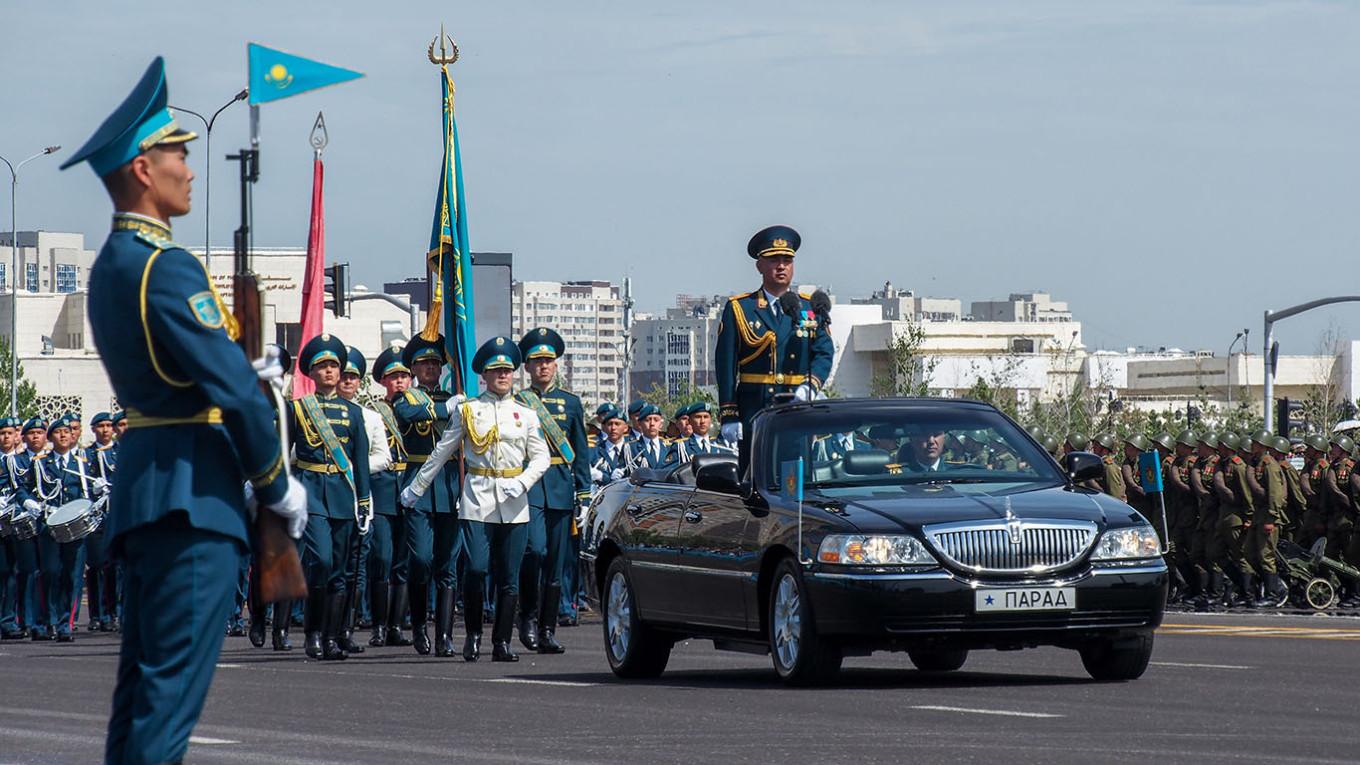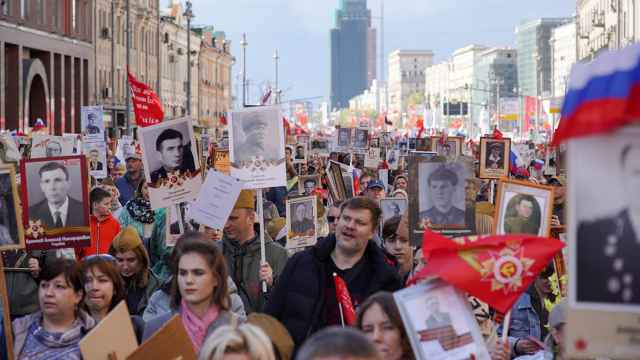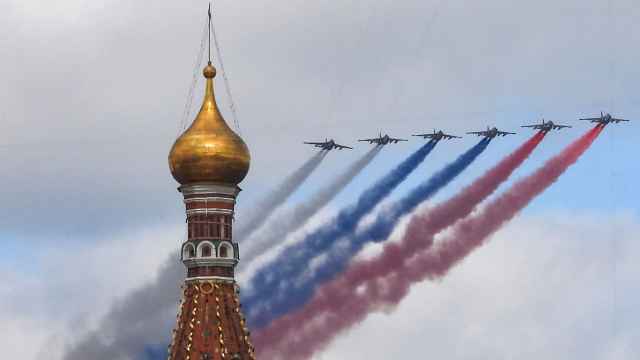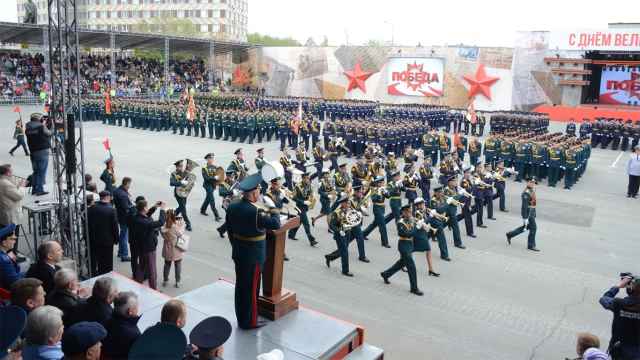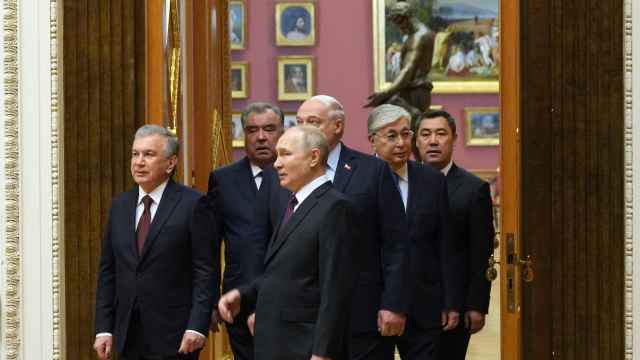Kazakhstan held a grand military parade to mark the 80th anniversary of the Allied victory in World War II and Defenders of the Fatherland Day.
“The Great Patriotic War was an extremely difficult challenge for all of humanity, including Kazakhstan. Those formidable days showed that war brings only sorrow and loss, while peace is an invaluable treasure,” President Kassym-Jomart Tokayev said Wednesday, addressing thousands of parade participants.
“In our country, the Batyrlarğa tağzym [‘Tribute to Heroes’ in Kazakh] march will take place, dedicated to Kazakhstani frontline soldiers. Descendants of the participants of the bloodiest war in human history will carry their portraits through the streets,” he continued.
Like other Central Asian neighbors that fought in World War II as part of the Soviet Union, Kazakhstan officially marks Victory Day on May 9. But this year’s anniversary parade took place ahead of time to accommodate Tokayev’s planned attendance at Friday’s landmark celebrations in Moscow.
“Tokayev has been attending Victory Day celebrations on Red Square regularly since 2022, just like other Central Asian leaders. This is a question of utmost importance [to him],” said Temur Umarov, an analyst at the Carnegie Endowment for International Peace.
“Leaders of Central Asian countries understand that Victory Day is a holiday fundamental to Putin’s worldview, and refusing an invitation would be considered a personal insult,” Umarov added.
It’s just one example of the long shadow cast by Russia over Victory Day celebrations in this Central Asian country.
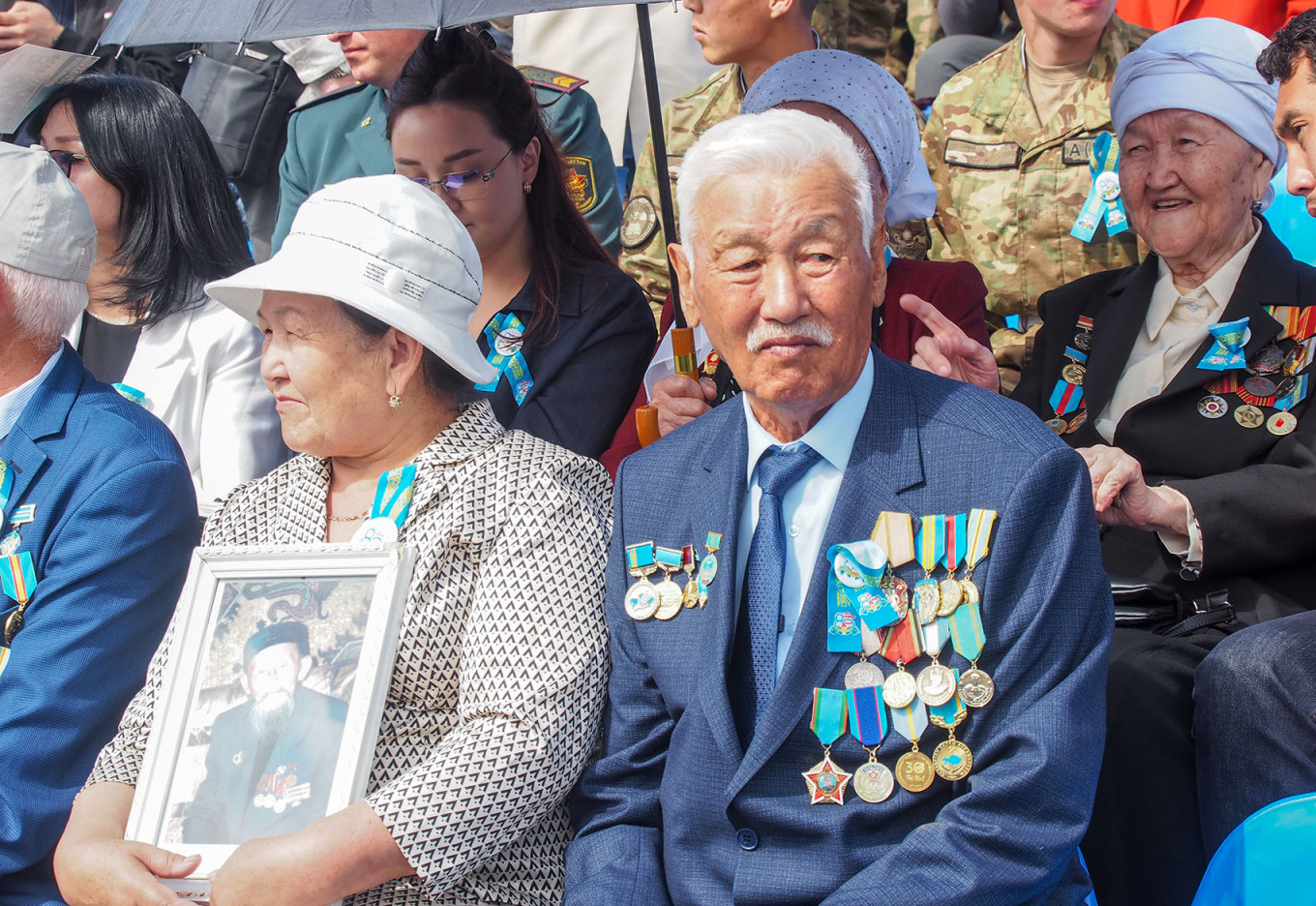
The decision to hold a military parade out of line with the holiday seemingly generated far fewer questions from the public in Kazakhstan than the Batyrlarğa tağzym march, which is meant to serve as the analogue of the Russia-propagated Immortal Regiment.
Born out of a grassroots movement, the Immortal Regiment was first held in the Siberian city of Tomsk in 2012. It was soon co-opted by the Russian authorities and turned into a global event.
Originally, the procession was meant to allow descendants of deceased veterans to connect with their family history by symbolically marching on behalf of their relatives. Critics note that the Kremlin’s overtaking of the event turned it into a useful propaganda tool that inflates Russia’s role in defending Nazi Germany and reinforces narratives of imperial revanchism.
A separate point of contention is the widespread use of the orange-and-black striped St. George ribbons at Immortal Regiment events worldwide.
Popularized by Russia as a symbol of victory in World War II, the ribbon was widely used as a symbol of pro-Russian sentiment in Ukraine since the early stages of the conflict in 2014 and now appears on symbols backing the Kremlin’s full-scale invasion.
In Central Asia and the Caucasus, the ribbon was associated with Russia’s colonial expansion far before the invasion of Ukraine, having been used to decorate Imperial Russian soldiers for military achievements in their wars of conquest.
This year, most regional authorities in Kazakhstan have banned Immortal Regiment processions, citing the lack of free public spaces, or moved the event online.
The news of the ban sparked an avalanche of deepfake videos in which public officials and prominent journalists call on people to join the processions in defiance of the official ban and the threat of arrest.
“It looks like Russian propaganda is completely desperate because no one wants to come to their party,” said prominent journalist Asem Zhapisheva, who was featured in one of the AI-generated videos.
“Just in case: May 9 is not a holiday for me, but a day of remembrance. And yes, I have people in my family who died in World War II — four of them. But I didn’t invite anyone to a party of striped ribbon lovers — not that great of an event,” she added in a Telegram post.
Authorities in Almaty, Kazakhstan’s largest city, eventually approved the rally under the name Batyrlarğa tağzym following a push from local veteran groups.
The city of Semey in northeast Kazakhstan will also hold a similar event.
Kazakh activist Zharkyn Kurentaev believes that the authorities’ eventual decision to hold an analogue of the Immortal Regiment could be interpreted as a signal to Moscow.
"It is possible that the authorities decided to hold [the rally] in response to the actions that preceded it. And this, I remind you, was Lavrov's criticism of Tokayev and Putin's call," Kurentaev told U.S.-funded broadcaster Current Time. "It was important from a diplomatic point of view.”
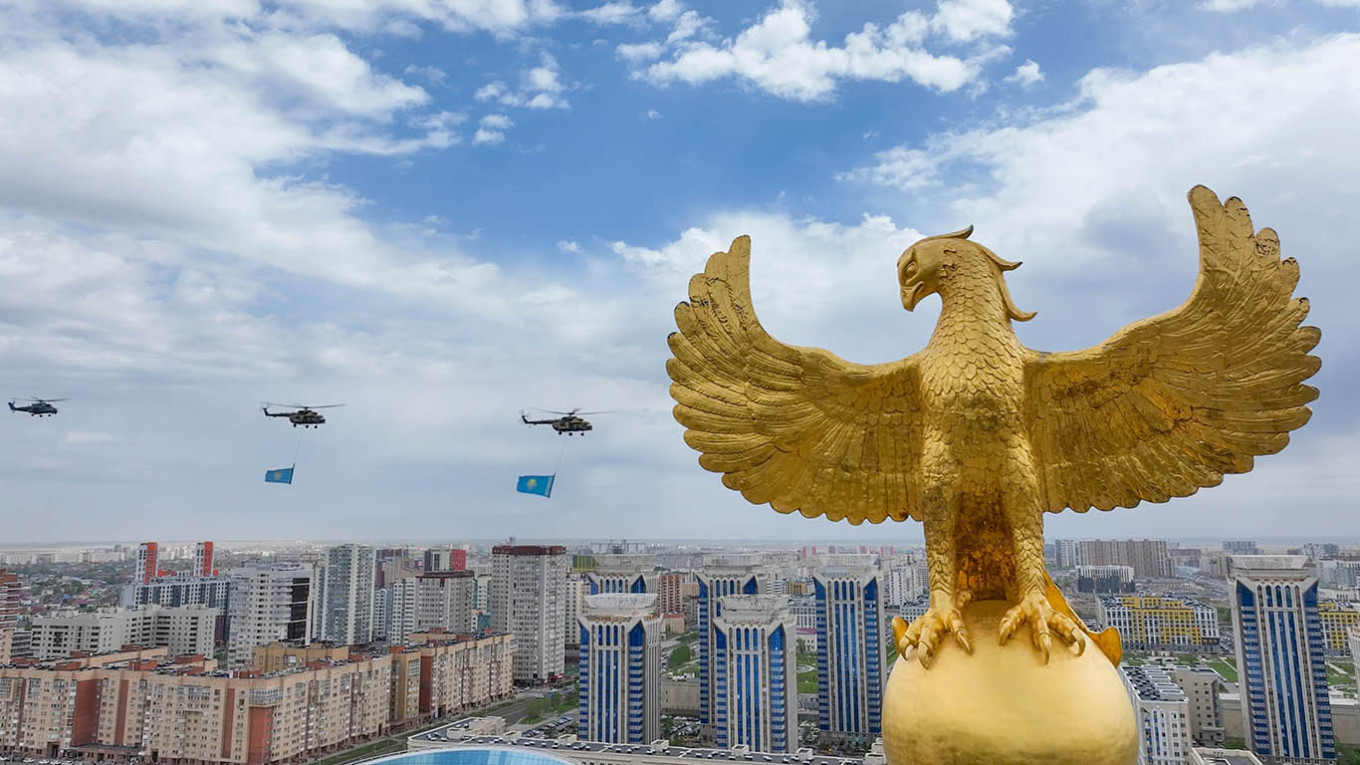
Analyst Umarov believes the relationship with Russia was not exactly central to the decision.
“Russia, of course, views any attempts by Central Asian states to reconsider shared holidays and shared values as an effort to distance themselves from Russia or even turn their back on it,” Umarov told The Moscow Times.
“But Central Asia is not trying to signal anything to Moscow [by allowing or banning Immortal Regiment processions]. This is more a question of domestic politics and social stability,” Umarov added, referring to neighboring Kyrgyzstan, where the Immortal Regiment will take place with officials’ backing.
The attempts to reimagine World War II commemorations in Kazakhstan go hand in hand with Russia’s invasion of Ukraine in 2022. That year, the authorities first came up with the idea to rename the Immortal Regiment rally and use a blue ribbon with Kazakh ornaments as the event’s official symbol. Yet, the St. George’s ribbon was still frequently spotted at that year’s event.
Bota Sharipzhan, an activist with the Oyan, Qazaqstan! civil rights movement, believes that “only a small group of people” in Kazakhstan have started to view May 9 celebrations differently since the full-scale invasion of Ukraine.
“Most still see the 'Great Patriotic War' and the war in Ukraine as ideologically different conflicts. For many, it’s not obvious that Russian fascism goes hand in hand with pobedobesie [victory-mania],” Sharipzhan told The Moscow Times. “I know people who are against the war in Ukraine but still go out on May 9 carrying their grandfather’s portrait.”
Around 178,000 natives of Kazakhstan were serving in the ranks of the Red Army at the start of World War II, with an additional 1.2 million drafted to fight as the conflict progressed. More than 600,000 drafties — or 11.2% of Kazakhstan’s population at the time — died in the war.
Sharipzhan notes that world-famous Russian World War II-era songs like “Smuglyanka” and “Katyusha,” movies about the war, and stories of Kazakh heroes like Bauyrzhan Momyshuly, Aliya Moldagulova and Manshuk Mametova were foundational to the upbringing of several generations of Kazakhs.
“I still can’t imagine how exactly we could transform May 9 from a 'celebration' to a 'day of mourning' in Kazakhstan,” said Sharipzhan.
“If May 9 is to be observed at all, it should be without parades: modestly laying flowers at the Eternal Flame, sharing stories about relatives who fought in the war on social media and talking about how devastating World War II was for us,” she said. “That would be more than enough.”
A Message from The Moscow Times:
Dear readers,
We are facing unprecedented challenges. Russia's Prosecutor General's Office has designated The Moscow Times as an "undesirable" organization, criminalizing our work and putting our staff at risk of prosecution. This follows our earlier unjust labeling as a "foreign agent."
These actions are direct attempts to silence independent journalism in Russia. The authorities claim our work "discredits the decisions of the Russian leadership." We see things differently: we strive to provide accurate, unbiased reporting on Russia.
We, the journalists of The Moscow Times, refuse to be silenced. But to continue our work, we need your help.
Your support, no matter how small, makes a world of difference. If you can, please support us monthly starting from just $2. It's quick to set up, and every contribution makes a significant impact.
By supporting The Moscow Times, you're defending open, independent journalism in the face of repression. Thank you for standing with us.
Remind me later.



